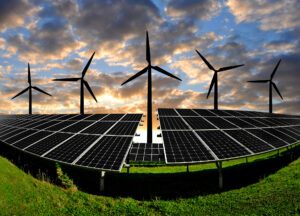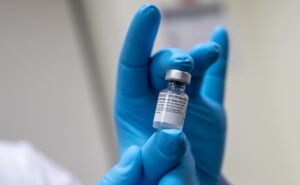
Ukrainian producers of electricity from renewable sources (RES) produced 222.6 million kWh in the period from April 5 to April 11, which is 17.2% more than the previous week, while electricity consumption in the country decreased by 0.9%, to 2.86 billion kWh.
According to the recent data of NPC Ukrenergo, the average daily electricity consumption on weekdays compared to the previous week decreased by 0.4% (to 416 million kWh), and on weekends by 2.2% (to 387.4 billion kWh).
Ukrenergo, in order to balance the power system in the face of surplus, on Saturday and Sunday of April 10 and April 11, gave dispatch commands to unload RES generation with a total capacity of 4,341 GW per two days.
“One of the main reasons for this was the decrease in electricity consumption during the specified weekend by 2.2% due to seasonal warming [from plus 5 degrees Celsius, on the weekend of the previous week to plus 8.8 degrees Celsius on April 10],” Ukrenergo said on its website.
According to the company, due to the warming, the volumes of electricity production by solar power plants and wind power plants have also significantly increased during the daytime, which accounts for the “decrease” of consumption. For example, on April 10 at 10:00, the RES capacity was 2.8 GW, while on weekdays in the same week it was 1.3 GW, and on the previous Saturday, April 3 it amounted to 2.1 GW.
“To balance the power system during periods of reduced consumption and at the same time intensive generation at solar and wind power plants, the dispatch center of Ukrenergo issued all possible commands for unloading, including at the request of manufacturers within the balancing market, and all available reserves have been used, except for RES producers. Also, all possibilities for increasing consumption by operating the pumped storage power plant in pumping mode have been exhausted, the limit volumes of imports in the Integrated Power System of Ukraine have been reduced to 0,” Ukrenergo said.

The visit of the Ukrainian delegation headed by Deputy Prime Minister for the reintegration of the temporarily occupied territories of Ukraine Oleksiy Reznikov to Israel resulted in the solution of a number of important issues for the country, in particular, to overcome the COVID-19 pandemic. The corresponding statement was made by the Ambassador of Ukraine to Israel Yevhen Korniychuk on his Facebook page.
“I want to thank all the delegates for their active position in the work and significant contribution to the issue of reaching agreements in cooperation with Israel. Together, we solved a number of important issues for our country, in particular, interaction in the field of trade, investment, medicine and in overcoming the COVID-19 pandemic,” the diplomat said.
He said that an important aspect of the negotiations was the completion by Israel of the second phase of trials of its COVID-19 vaccine in mid-summer.
“The Ukrainian side proposed to conduct the third stage of testing in Ukraine with the subsequent possibility of producing a vaccine, including at our facilities. Israel is still studying this proposal and, I hope, it will be received positively. It is already clear that the pandemic of coronavirus infection will drag on for more than one year in the world. And the production of the vaccine, its availability for our citizens is a very sensitive and important issue for us,” Korniychuk said.

Coronavirus (COVID-19) epidemic in Ukraine is starting to decline, the situation in many regions is stabilizing, Health Minister of Ukraine Maksym Stepanov said.
“We have withstood another jump in the incidence of COVID-19, and gradually the situation started to improve. Now in many regions the situation is stabilizing. We have been observing a decline in incidence in Ukraine within ten days,” he wrote on the Facebook page on Wednesday.
Stepanov said that on the eve of Tuesday, April 13, “was the first day when the number of people discharged from hospitals exceeded the number of hospitalized people by 22.8%.”
He also said that 2,000 fewer patients were admitted to hospitals last week than a week earlier, and several regions, in particular Ivano-Frankivsk and Zakarpattia, left the “red” zone.
At the same time, Stepanov said “some regions, in particular the city of Kyiv, as well as Kyiv, Lviv and Poltava regions, continue to be in the ‘red’ zone of increased epidemic danger and the situation there remains extremely difficult.”
“It is very important to continue adhering to the established restrictions and anti-epidemic measures: wearing masks, using antiseptics, avoiding crowds of people,” the minister said.